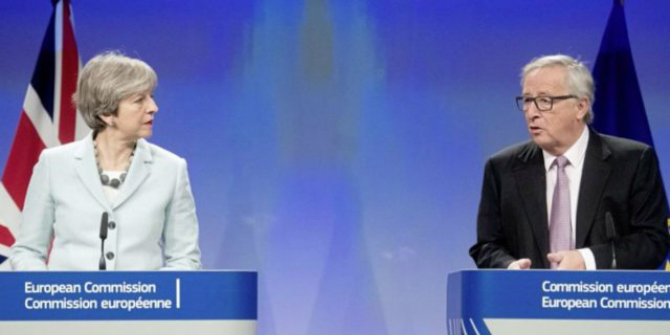Here we go again. The EU is accusing the UK of cherry-picking in the Brexit negotiations. And the UK does not deny it. This time the issue is the Erasmus programme, writes Anne Corbett (LSE).
Michel Barnier, the EU chief Brexit negotiator, told the European Parliament earlier this week that he has closed the chapter on Erasmus because there is no agreement. The British side, for its part, claims participation in the next programme running from 2021-2027 is still subject to negotiations. The UK will ‘consider options for participation in elements of Erasmus+ on a time-limited basis, provided the terms are in the UK’s interests’.
Viewed from Whitehall there is a justification for setting conditions. The UK appears to be buying time for a publicly-funded mobility plan for outward bound students, which it can then boast as a victory for national sovereignty while counting on the ignorance of what else Erasmus+ does that the education world might appreciate. The chancellor of the Exchequer, Rishi Sunak, has already set aside funds in his latest spending review, published by the Treasury. The promise is accompanied by the time-honoured formula ‘further details will be set out in due course’.
Viewed from the EU end, Brussels has logic on its side in asking for the UK to sign up for the whole seven-year Erasmus programme and pay an association fee based on a calculation of GDP. Erasmus is not just a cherry-pickable student mobility programme. It is a big and complex education support programme. In 2019 alone it helped almost a million people to study, train or volunteer abroad, involved around 111,000 organisations (including universities and think-tanks as well as private businesses, and around 25,000 projects at a cost of €3.37 bn.) Reviews testify to the programme’s success.

Erasmus is structured in terms of three key actions. The main one is support for learning mobility of students and staff. It started with higher education but now extends to vocational education and training, staff in school and adult education and the youth sector. It also supports the Erasmus Joint Master Degrees, which require students to work for masters’ degrees in universities in three different countries.
A second strand is based on cooperation for innovation and the exchange of good practice. This includes the support for the new European Universities Initiative and the development of such higher education tools for an interconnected world as mutual recognition, as well as a host of initiatives for skills development in further education, and the much in vogue civil engagement opportunities for volunteers. A third strand supports policy reform with a focus on youth, the biggest victims of COVID-19.
However for the Brexit lobby, in the ascendant in the UK government, the full Erasmus programme has elements they detest. The Jean Monnet Activities is one. Designed to promote ‘excellent teaching and research in the field of European Studies’, Brexiteers class it as propaganda. They also dislike the European Solidarity Corps, a portal for volunteering and trainee organisations offering opportunities for engagement in civic and environmental projects. Down the policy plug hole will also go support for the Joint Masters degree programme of Erasmus Mundus, the knowledge alliances and the capacity building on the European neighbourhood which maybe to a Brexit ear sounds like foreign aid.
Bête Noire – The Jean Monnet Activities aim at:
- promoting excellence in teaching and research in the field of European Union studies worldwide
- fostering the dialogue between the academic world and the society, including local and state-level policy-makers, civil servants, civil society actors, representatives of the different levels of education and of the media
- generating knowledge and insights that can support EU policy-making and strengthen the role of the EU in a globalised world
UK reactions
The UK higher education sector and business interests are strongly opposed to the UK quitting the Erasmus programme. The reactions run the gamut of ‘it would blow a hole in the UK economy’ through ‘many employers deeply value the kind of international experience the Erasmus scheme helps foster’ to regret for the loss of opportunity that Erasmus has provided for students in some of the most deprived parts of the country, ‘to level up opportunity, experience and aspiration as well as ensuring that we are viewed as an open, tolerant and welcoming country to the rest of the world’.
The firm pledge to continue funding outward UK student mobility – whatever happens in the UK-EU negotiations – has been greeted with relief. That is a measure of how far university expectations have fallen over the past four years. Universities still do not know the outcome concerning the associated EU programme Horizon, strongly backed by the UK research community. But they are showing how grateful they are for small mercies.
It is hard to overestimate how far Brexiteers have made the running on how to handle the educational initiatives that the Commission has worked on for over 30 years and which have been widely appreciated across the education sector. The clue to their success is the Treaty of Maastricht, 1992. It was then that, despite it being clear that the EU could not infringe national control of education, the EU was empowered to develop educational initiatives tied to quality. And it was then that a very small group of Conservative MPs took Maastricht to start their campaign for Brexit, with new evidence of their efficacity day by day.
This article gives the views of the author, and not the position of LSE Brexit, nor of the London School of Economics.







As I understand it there is agreement that Northern Ireland students, who are of course entitled to be citizens of either the UK or Ireland or both under the terms of the Good Friday agreement , can continue to enjoy the full benefits of Erasmus. Is this correct?
Anne to Denis Northern Ireland students. One might have thought that there would not be probems. But I can’t find an authoritative statement. My website search revals everything is fine for Irish students in NI but I find nothi ng about NI students specifically either on the Commission webpage or this otherwise helpful page from University of Ulster https://www.ulster.ac.uk/brexit/students/questions.
This may be a pointer.’On 22 July 2020, the Irish Government’s Department of Transport confirmed that drivers travelling from Northern Ireland over the border to the Republic of Ireland after the transition period (1 January 2021 onwards) would be required to carry a green card.’
Looks as if the case for choosing Irish citizenship is building… I’d be interested to know what you find.
Looks like my information on the continuance of access to Erasmus by Northern Ireland students was correct
https://www.bbc.co.uk/news/uk-northern-ireland-55442685
In many ways the dual position of Northern Ireland in effect being in both the EU and UK single markets could work to the advantage of the province.
Good article however the UK has a right to not want EU brainwashing of our students as is happening right now ;Higher Education is at present represented by those with a vested interest in ensuring EU dominance in our Country ; They see no problem with control from Brussels and the pushing of EU objectives in our Schools and university’s ;While not opposed to shared education i view certain parts of it as very similar to hitler youth programs of the 30s ; I’m sure that the Pro EU faction will react with fury and deny the link but then that is to deny History ; If we don’t learn from History we will make the same mistakes again just as they are doing in Europe right now.
Facts 4 Brexit pointed out that “three of the top five destinations for UK students studying abroad are in neither the EU nor Erasmus+. Which certainly brings into question the idea promoted by Europhiles that Erasmus+ is either necessary for, or a major factor determining, study abroad.
None of this is to say, of course, that participation in Erasmus+ is not worthwhile. Cultural exchange is always valuable in its own right, and international students undoubtedly make a positive contribution to the UK in many different respects.
Nevertheless, every financial commitment has opportunity cost”
I have complained about the loss of Erasmus several times to my MP, Suella Braverman, herself a beneficiary of the scheme. Nothing in response. As a Brexit-Ultra she follows the ERG line of silence and refuses to be accountable for the disaster that is Brexit. Truly shocking.
There are only a very limited number of UK universities involved. Many more students come to UK universities than go the other the otherway. The EU is losing access to some of the best universities in the world which they don’t have. The EU cuts its own nose to spite its own face….again.
Thanks for reading! Herewith three comments
(i) Is Erasmus a brainwashing operation? It depends on your view of higher education students. I suggest that higher education would have already developed their critical faculties. Exposure to an experience in a different language and culture is bound to enhance those faculties still further. They are not dupes.
(ii) Three of the top destinations not EU – let us compare like with like. In which case EU destinations should be totalled. Of course, students have the right to choose their destinations and if most UK students to go to Anglophone destinations that is also a reason to reflect on UK language teaching policy and the university’s own privileged links.
(iii) If there are more incoming Erasmus students than outgoing, again it is worth looking at the wider picture and see which are the main sending UK universities. It varies but unlike the Continental a number of elite institutions do not participate. If you have more detail please send.
I am shocked at the u-turn that this decision represents, especially as Boris Johnson previously gave a commitment to remain within the Erasmus scheme. I have two teenagers at university; one at Kent which appears to benefit hugely from its Erasmus/European connections and indeed positions itself as “The European University”. I would be interested to know if there are any campaigns or lobbying opportunities that are seeking to try to overturn this seemingly short-sighted decision because I would like to support and/or help them. Like it or not we will always be part of Europe geographically and economically. Leaving the EU already significantly reduces options and opportunities for young people; ending participation in the Erasmus scheme is yet another hugely disappointing development in a string of broken promises.
The Brexiteers are being blamed here, yet it is entirely a political move on both sides to further blacken Brexit and its consequences in the eyes and minds, especially the minds, of the young people with tertiary and concomitant career ambitions who, supposedly, have their critical faculties well-, if not fully, developed and on the right basis- the right basis here, of course, is neo-feudal globalisation and the piecemeal destruction of the democratic nation-states in Europe in the first instance, and elsewhere, if any large nation-state which is nominally democratic, such as India and the US electorates can be made to join the nascent new world order. The EU cabal coopted Bach without his permission. The EU also coopted Erasmus without his permission. In the latter case, it is without a doubt that various benefits accrue from such and like schemes. That is not the point, however, either being argued here above the line or below it. At every turn, the EU project follows a design and intent with the federalisation of Europe in mind. The Acquis ‘principle’ is one of its most important pillars. The EU and its agents at every twist and turn seek to further their project. As a consequence, the Erasmus business is entirely political. Boris, in this, is also entirely political. However, for the students who had hoped to avail themselves of this scheme and are disappointed by their changed (not reduced) prospects in life, the disappointment is financial. Of course, not everyone who thought to profit from the scheme would in fact eventually be able to be part of it, and the career prospects it might offer in the money-from-thin-air print and QE-as-you-go ECB/EU apparatchik gravy train, but not being able to obtain that lottery ticket in the first place is a disappointment. This is a lesson in politics for them and every other person affected. It is also a lesson in life as it is being lived. One door closes, or so it seems, another was already open but unnoticed. Forever and the day we hear about people going places thanks to the EU. Before the EU, as before Covid-19, when nobody ever died, or even was ill, apparently, before the EU, people were unable to work and live, study and do research, etc., in countries other than where they were born, we have to believe according to EU doctrine. Well, there is life after Brexit, when it comes, after Brino. There is even life after the EU, even if we don’t know what kind of Europe will be left after the old guard in European imperial power politics has wrecked the place in its bid to hold on to power come hell or high water. Once again, it is the English who have given the European peoples the opportunity to save themselves. It will be a long struggle. Both China and the US Imperialists would like to see Europe as part of the new (old) neo-feudal imperial order. We’ll see how that pans out.
Your guys won, Jacob. Why are you still so bitter and twisted?
A strange comment. Who won? That remains to be seen. We know who will lose in due course, but Brino is only the end of the beginning. Democracy has a long way to go. If anyone is bitter and twisted, it would have to be those Remainers who will never give up sabotaging democracy and civil rights because they lost a referendum. We know from history that the result of pulling down the pillars of civil society and sabotaging political order is predictable. Politics is a learning curve. If some people do not take it or get it, another opportunity will present before long. Europe will never be united by force, manipulation and deceit.
David Jonker,I like reading your comments. Not bitter or twisted in the least.Well put,well thought out and interesting. Long before the Erasmus idea, as a 17 year old, I has a great time on a British Council scheme in Florence. I think it was 6 months. Also worked in bars.Wandered all over Italy. I see there is another scheme for young people being planned by the British Government to replace Erasmus. I think you are right to point out that there could be light rather than gloom.
Don’t take my comment too seriously Jacob but I was rather hoping the stuff about EU doctrine etc might be dialled down a bit now. Where I hope we could find agreement is that I think remainers should not now sit on the sidelines and carp about how much better it would be if we had stayed in the EU. We have left the EU and must regard the “deal” as a basis for working towards the best available relationship with the EU countries. There are many gaps and incomplete areas in the deal which will need further discussion and negotiation. We should all support that process.
Can we dial down the future? Let’s hope that not many people in the EU, Europe or anywhere wish they could, this year or anytime. The EU is a project unreformable. What that means the peoples in the EU member states will have to fill in.